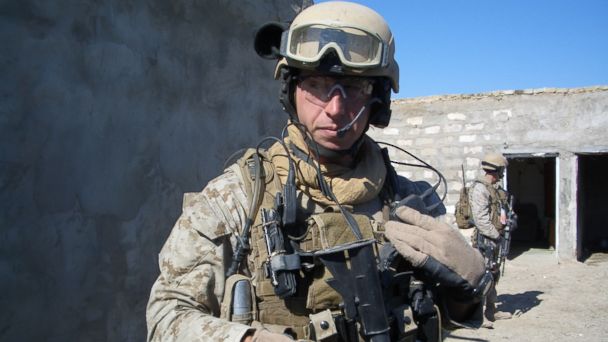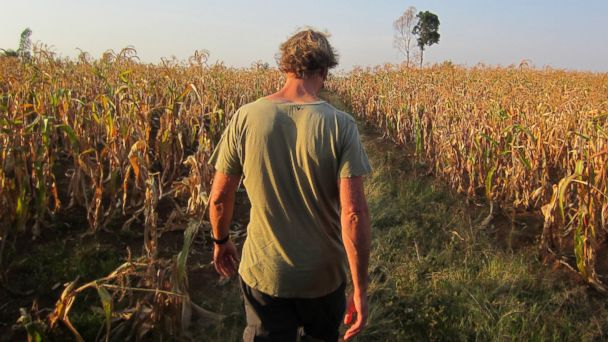A Marine's Mission to Fight Poverty, Combat Terrorism
ABC News' Producer Angel Canales and Editor Arthur Niemynski report:
BRENTWOOD, Calif. Before joining the Marine Corps, Jake Harriman had listened to his father talk about his eight years of service in Vietnam. "He would always tell me stories about his time in Vietnam, and I always felt a commitment and need to serve," says Harriman. While going to school, he felt a nagging sense of wanting to travel and see the world and go on an adventure that led him to join the military.

Jake Harriman on target during a direct action raid in Iraq in 2005. Harriman launched Nuru International in 2008 after a life-changing experience that gave him a new perspective on life. (Courtesy Nuru International)
Harriman served in the Marine Corps for seven and half years. He graduated from the U.S. Naval Academy and served as a platoon commander in both the Infantry and a Special Operations unit called Force Recon. During his time there, he led Marines in four operational deployments throughout Southwest Asia, Southeast Asia, the Middle East and Africa, including two combat tours in Iraq, and was awarded the Bronze Star for actions in combat during his second tour in Iraq.
"I loved the Marine Corps, the missions, the adventure and the excitement and adrenaline rush, but when I was in combat I had some pretty severe experiences that opened up my eyes to a new way to look at the world," he says.
In April 2003 a life-changing experience gave Harriman a new perspective on life. After witnessing the brutal murder of the family of a farmer trying to escape Iraqi militants, for the first time Harriman says he didn't know what to do. "I put myself in this guy's shoes and everything slowed down, and I thought, 'I live in a world of choices. We all want to go to school; we want our kids to grow up and we decide what kind of breakfast we'll eat or clothes I will wear. I mean, what were this guy's choices that morning. He can watch his kids starve to death or make a desperate attempt to provide for his family. He didn't have any choices," says Harriman.

Jake Harriman taken following reconnaissance and surveillance mission in Iraq. (Courtesy Nuru International)
That was the beginning of Harriman's desire to help and have a greater impact on the war on terror and fight against what he believes is the leading contributor of terrorism, which is extreme poverty. "I talked to my guys about my idea and that I wanted to get out and tackle this issue from a different flank," he says.

Jake Harriman CEO and founder of Nuru International outside the Nuru team house near Isibania, Kenya. (Courtesy Nuru International)
Leaving the Marine Corps was a very difficult decision for Harriman, but so was continuing to see the same problem when deployed. "When I got out I quickly realized that extreme poverty is a massive problem. I wasn't a Peace Corp guy or an economist. I was just a Marine with an engineering degree from the Naval Academy, but I was committed," says Harriman
His commitment to fight extreme poverty led him to enroll in the Stanford's Graduate School of Business to build an organization that could ultimately combat the problem of extreme poverty. Harriman launched Nuru International in 2008. "I didn't want to repeat the same mistakes made in the past. I didn't want to build an organization that was going to have little impact in a couple of villages. I wanted to build a company," he says.

: Jake Harriman walking to work to meet some farmers in Kuria West District, Kenya. (Courtesy Nuru International)
Nuru International focuses on creating leaders and equiping people with tools and knowledge to lead their communities out of extreme poverty. They use local income-generating activities and address four key problems, including hunger, ability to cope with economic shocks, preventable disease and death and lack of quality education for children. Nuru has four programs: agriculture, economic development, health care and education. "Every organization to be lasting requires two things, people and capital. We have an aggressive leadership program that identifies leaders within a community to be able to build the solutions in their communities long after we're gone," says Harriman.
Nuru's goal, according to Harriman, is to go into these countries and build a working model with the leaders over seven years and leaving a self-sustaining model independent of Western staff and donations.
Since Harriman launched Nuru in Kenya and Ethiopia, where it helped a handful of farmers, it has grown to benefit more than 30,000 people. "Extreme poverty rips away an individual's plan for the future. I've seen the power of giving people the ability of make meaningful choices for their families, and I'm so excited about the potential of this model in a global scale," says Harriman.
Second Tour is an ABC News digital series profiling the lives of military veterans who are doing unique things in the civilian world. For more stories visit http://abcnews.go.com/US/Second_Tour/.